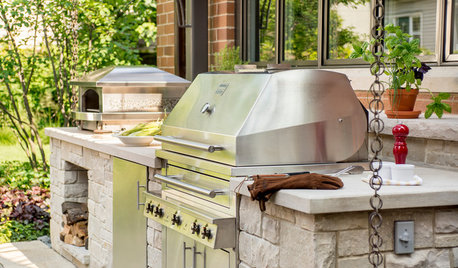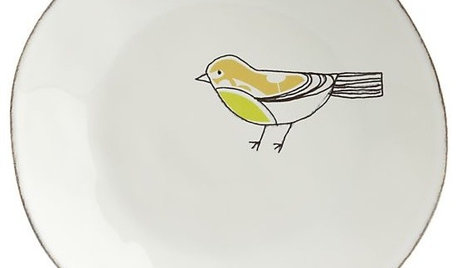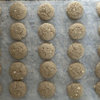Barbecue rubs and sauces
fawnridge (Ricky)
4 years ago
Featured Answer
Sort by:Oldest
Comments (14)
yeonassky
4 years agoIslay Corbel
4 years agoRelated Discussions
Smokey BBQ sauce, Bourbon Butter and Rub
Comments (3)I've saved both recipes. I figure I can leave out the salt in both the rub and the sauce and then use Heinz No Salt Added Ketchup in the sauce. Thanks! I was looking for a homemade barbecue sauce to use. This looks like it packs enough flavor that the salt won't really be missed. Sue...See MoreBBQ sauce....no soy sauce
Comments (2)I love, love this one for chicken. For pork, I use Sue's Roadhouse ribs recipe. __________________ Easy After Work BBQ Chicken Recipe courtesy of Paula Deen Ingredients 1 (3 1/2-pound) chicken, cut into 8 pieces Salt and freshly ground black pepper Easy BBQ Sauce: 3/4 cup ketchup 1/4 cup plus 2 tablespoons packed dark brown sugar 3 tablespoons white wine vinegar 2 tablespoons minced onion 2 tablespoons Dijon mustard 1/4 to 1 teaspoon hot sauce, (recommended: Tabasco) 1/4 teaspoon freshly ground black pepper 3 tablespoons chopped scallions (white and light green parts) 1 1/2 teaspoons freshly grated lime zest 1 1/2 teaspoons freshly squeezed lime juice Lime wedges, for serving Directions Prepare a medium-hot grill or preheat the broiler. If using the broiler, line a rimmed baking sheet with aluminum foil. Season the chicken with salt and pepper, to taste. Put the chicken on the grill or, if broiling, put it on the prepared baking sheet. Grill or broil, 4 inches from the heat, turning once, for 10 minutes per side. Put 1/2 of the BBQ sauce in a small bowl, for drizzling and serving. Reserve. Baste the chicken with the remaining sauce and grill or broil for 5 minutes more. Transfer the chicken to a serving platter, drizzle with some of the reserved sauce, and serve with lime wedges and the remaining reserved sauce. Easy BBQ Sauce: In a small bowl, whisk together the ketchup, brown sugar, vinegar, onion, mustard, hot sauce, and black pepper. Stir in the scallions, lime zest, and lime juice. Can be covered and refrigerated for up to 1 week....See MoreBBQ Ribs -- Share your rubs, tips, recipes -- No judgment:)
Comments (54)The pic is great. That is one happy smoker, : ) Smoked a pile of ribs early Spring. Low and slow packed tight. open the packets at some point...no competing here. I only get the Costco ribs. Planning another round this coming weekend. Garden is planted and on its own now except for minor up-keep. Ribs are a good project. I like the GaramMasala addition to the rub. I make my own GM so I just may do one of the packs using that version. My spice rub falls into the complicated category but I have the spices and like fresh roasted, ground fresh. Doesn't take long at all and I can stock up other blends that are low at the same time. I bbq a big batch while I'm at it. I swear the neighbors can smell it. One is a football field away and the other is 3 fields away. We do fair trade with the closer. His leeks are baseball bats and mine are toothpicks. He brings leeks and I give all the rhubarb they want. "whatcha cookin'?". The other neighbor is 6'6 and huge. He could use the walk but he drives. "whatcha cookin'?". He offers nothing but an appetite, lol. Plenty for everyone. I plan on 8-10hours. Start about 9am. All I have patience for. I aim for fall-of-the-bone with a tug. I like it to hold on. Leftovers I pull off the bone and food saver in packets for the freezer for mid week quick tacos. I use wood, side fire box. Free fuel. Maple, birch, pear, plum, apple. Old trees. Mesquite powder is a great ingredient. From the seed pods, not the bark/wood. Smells like milk chocolate. HERE...See MoreIs there an approved barbecue sauce recipe for canning?
Comments (10)We have made some in the past -- years ago, and they were sweet and flavorful spicy -- not so much heat spicy. It has been long enough that I cannot tell you which recipe or what book (sorry, we didn't repeat because it was so much stuff, so long to cook and after a few batches still wanted to adjust -- not worth it for us) -- but they are out there. You can always adjust the heat in a recipe to suit your taste if it is otherwise close. The 2 hot red peppers can give a wide swing -- and the cayenne amount from 1/8 to 1-1/4 tsp is a big swing too. I wouldn't add the hot sauce or cayenne until tasting. Check the Ball canning book and some other canning books. If you are a member of Eat Your Books, you can search their database to see that books have canning recipes and barbecue sauce....See Moreannie1992
4 years agoIslay Corbel
4 years agoFeathers11
4 years agoJoe T.
4 years agoshuffles_gw
4 years agoplllog
4 years agoUser
4 years agoSherry8aNorthAL
4 years agoM
4 years agosleevendog (5a NY 6aNYC NL CA)
4 years agonancyofnc
4 years ago
Related Stories

OUTDOOR KITCHENS10 Gifts Perfect for the Barbecue Enthusiasts on Your List
Get ideas for outdoor grilling tools, accessories and equipment that backyard chefs will love
Full Story
GARDENING AND LANDSCAPING21 Patios Ready to Party
Mix up some margaritas and break out the barbecue sauce. Outdoor party season is upon us, and these patios show how to do it right
Full Story
URBAN GARDENSOnce a Barren Rooftop, Now a Serene City Getaway
An outdoor shower and dining area atop a Manhattan penthouse? Stop rubbing your eyes and start checking it out
Full Story
HOLIDAYSInternational Traditions: Christmas at Home in Australia
Diving into pools and brandy-laced pudding with equal gusto, Australians keep on the sunny side at Christmastime
Full Story
DINING ROOMSRoom of the Day: An Elegant North Carolina Dining Room
Sophistication meets durability and easy-to-clean surfaces in a dramatic style-mixing space
Full Story
CLEANINGThe Basics and Essentials of Natural Cleaning Solutions
A few household ingredients provide a sparkling-clean home
Full Story
PRODUCT PICKSGuest Picks: Ready for Spring!
Get ready to celebrate the upcoming season with a palette of fresh green, pink and yellow
Full Story0

GARDENING AND LANDSCAPINGSplurge of the Week: The Kamado Grill
These Unique Grills Look as Good on the Outside as What's Cooking Inside
Full Story
FOURTH OF JULYHow to Keep Your Pet Calm During Fireworks Season
Get tips for helping pets feel safer and less stressed around the Fourth of July holiday
Full Story
OUTDOOR ACCESSORIESCare Guide: How to Clean Your Patio Cushions
Ready your furniture for spring and summer with these tips for removing sunscreen stains, mildew and more
Full Story





Joe T.